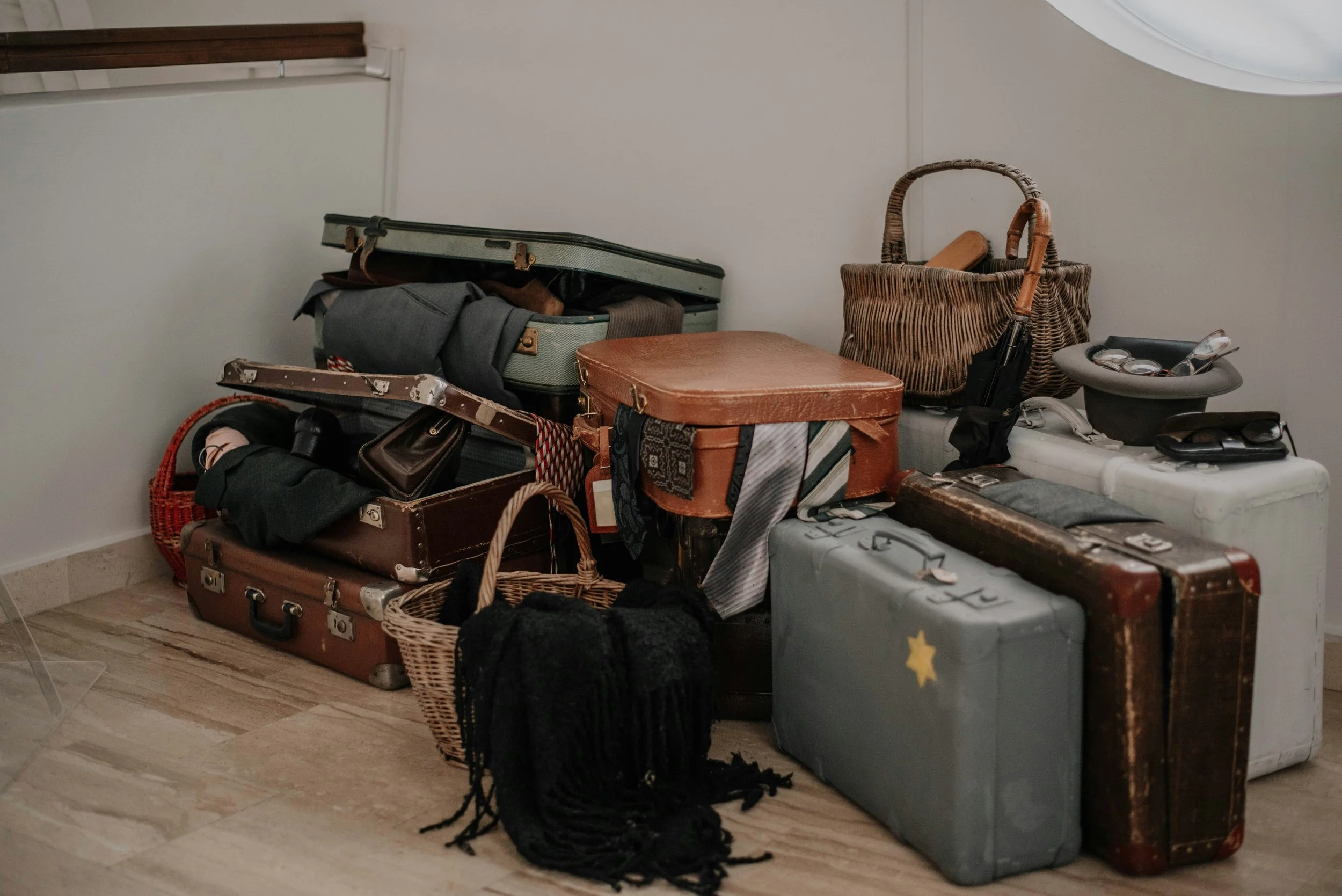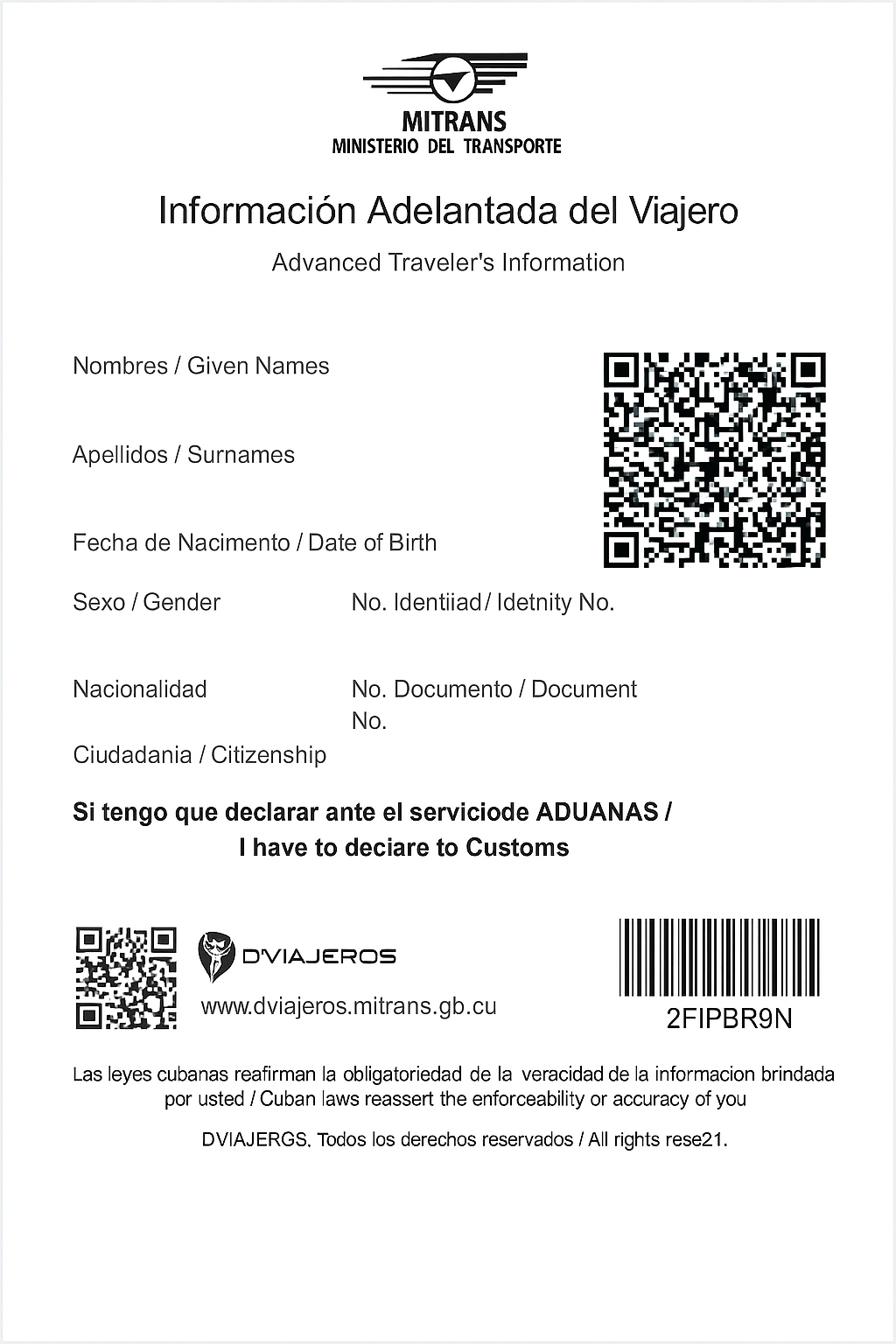
Cuba Travel Essentials
Everything you need to prepare for a smooth trip to Cuba: flights, luggage, passports and e-visas, OFAC compliance, money, packing lists, health guidance, connectivity, safety tips, art purchases, and U.S. re-entry.
Flights & Luggage
The following airlines currently operate flights between the U.S. and Cuba. Policies may change; always confirm before booking.
Airline: American Airlines
Routes: Miami (MIA) and other hubs to Havana (HAV)
Official Links: Cuba Travel Page | Checked Baggage | Oversize/Overweight
Airline: Delta Airlines
Routes: Atlanta (ATL) to Havana (HAV)
Official Links: Cuba Travel Advisory | Baggage Overview | Embargos/Restrictions
Airline: JetBlue
Routes: Fort Lauderdale (FLL)/ Orlando (MCO)/ New York (JFK)/ Boston (BOS) to Havana
Official Links: Cuba Destination | Checked Bags | All Baggage Info
Airline: Southwest Airlines
Routes: Fort Lauderdale (FLL)/ Tampa (TPA) to Havana (HAV)
Official Links: Flights to Havana | Checked Baggage Policy
Seasonal Suspensions & Policy Notes: Routes and baggage rules can change. American’s Cuba page currently notes an allowance of up to two checked bags up to 70 lb each for Cuba; Economy fares typically use 50 lb limits. Delta and Southwest standard checked bags are limited to 50 lb (23 kg). Southwest introduced checked bag fees in 2025. Exceeding weight or size limits incurs additional charges—use the official links to confirm your exact flight.
Entry Points: Most travelers enter via Havana (HAV). Other gateways: Santa Clara (SNU), Holguín (HOG), Camagüey (CMW), Santiago de Cuba (SCU).
Luggage Basics: Standard checked bag limit is 50 lb (23 kg) and 62 in / 158 cm total dimensions across U.S. airlines. Overweight (51–70 lb) or oversize bags incur fees; some routes and seasons have embargoes on extra pieces. Premium cabins may allow 70 lb (32 kg). Always verify at the official links above.
Baggage resources: United, JetBlue, American
Before You Go
Complete the D’VIAJEROS Advance Traveler Information Form within one week of travel. This is the official Cuban government form that combines immigration, health, and customs information, and it is required to board your flight and enter Cuba.
Step 1 — Access and Language Selection
Go to the official site: dviajeros.mitrans.gob.cu. On the homepage, scroll to the top-right corner and select your preferred language from the language menu before you begin.
Step 2 — Fill Out the Form
Be prepared with the following information before you start:
Personal details: full name, date of birth, gender.
Passport information: number, issuing country, expiration date.
Contact details: home address and phone number in the United States.
Travel details: airline, flight number, date and time of arrival.
Address in Cuba: for trips outside Havana, entering a Havana address is sufficient.
Purpose of travel: tourism, family visit, Support for the Cuban People, work, etc.
Health declaration: recent symptoms, vaccination information if requested.
Customs declaration: items to declare, cash being brought in, etc.
When you finish, the system generates a PDF confirmation with a QR code.
Step 3 — Presenting the Document
Save the PDF on your phone or print it.
You must present it:
At airline check-in in the United States before boarding your flight.
Upon arrival in Cuba:
It will be scanned just before the immigration booths at the health and entry control point. Immigration officers can see your information on their screens and may ask you to present the QR code again. (See example below)
Legal Basis (OFAC)
Travel to Cuba by U.S. citizens and residents is regulated by the U.S. Department of the Treasury. The Office of Foreign Assets Control (OFAC) administers and enforces these regulations because all U.S. currency—even outside the country—is under Treasury jurisdiction. The current rules allow you to visit Cuba under the “Support for the Cuban People” general license.
This license requires that travelers maintain a full-time schedule of educational and meaningful interactions with Cuban individuals, supporting private sector activity and avoiding prohibited entities. There is no pre-approval application as long as you follow the requirements of the license.
Documentation to Keep: You must retain for at least five years:
Your signed Travel Authorization / Affidavit (provided by Oscar’s Odyssey).
Your final itinerary showing full-time qualifying activities.
Receipts of private-sector spending (meals, lodging, services).
These records may be requested by U.S. authorities in the event of an audit.
Oscar’s Odyssey designs programs to comply with OFAC requirements and will provide you with the necessary affidavit and documentation. It is your responsibility to retain these documents and to engage fully in the scheduled activities while in Cuba.
Arrival in Cuba
Upon arrival: present passport and QR code, collect baggage (delays possible), clear customs. Your guide will meet you outside with an OSCAR’S ODYSSEY sign. Never leave luggage unattended.
Medical Insurance: Included in airfare as a surcharge. Keep boarding pass as proof.
Trip Cancellation Insurance: Compare options at Squaremouth, which offers a “Zero Complaint Guarantee.”
Prohibited items: No pornography, fresh fruit, meat, hotplates or toasters. Laptops, phones, consumer cameras allowed.
Safety: Pedestrians do NOT have right-of-way. Stay alert when crossing streets. Violent crime is rare; main risk is petty theft of unattended items.
Money & Currency
Bring enough cash — about $125 per person/day for meals, drinks, taxis, extras. Carry small denominations and avoid marked or torn bills. It’s better to bring more and return with unused funds than to run out.
Credit & Debit Cards: U.S.-issued credit and debit cards do not work in Cuba due to U.S. banking restrictions and OFAC regulations. ATMs will not accept them and most point-of-sale terminals cannot process them. Even if you hold a card from a non‑U.S. bank (European, Canadian, etc.), most private businesses — restaurants, bars, and shops — do not have card terminals and operate on a cash‑only basis. Plan your budget assuming you will pay in cash for almost everything.
Exchange Rates: Cuba has an official exchange rate (≈ 123 CUP per USD), but private businesses — including most of the restaurants, drivers, and shops you will visit — operate using the informal market rate, which is significantly higher. This rate is published daily by eltoque.com and reflects the true purchasing power of the dollar.
Because the Cuban peso is highly unstable, many private establishments prefer to accept U.S. dollars directly, often at a rate close to or equal to the informal market rate. This means you may not need to exchange much money at all — simply use clean USD bills for most transactions. If you do exchange cash, your guide will help ensure you receive a fair rate based on current informal exchange values.
Cash Handling — Denominations & Bill Condition: Bring a mix of small denominations (USD $1, $5, $10, $20) in addition to larger bills. Private businesses often need change, and smaller notes speed up transactions.
Use clean, crisp bills only — no tears, tape, excessive wear, or writing/marks.
Do not bring coins (U.S. coins are not accepted in Cuba).
Inspect bills before traveling; merchants may refuse damaged or marked notes because they cannot easily exchange them locally.
What to Bring
Pack for the season: November–April is mild (75–80°F), May–October hotter (85–90°F) with chance of storms. Bring light, breathable clothes, sweater or rain shell, dressy outfit for a night out, hat, sunglasses, sunscreen, comfortable walking shoes.
Most outlets are 110V/60Hz flat prong, but some hotels have 220V (round prong) — pack universal adapter.
Medical & Personal: Bring prescription meds (in original bottles), OTC meds (ibuprofen, anti-diarrheals), vitamins, toiletries, sunscreen. Pack toilet paper, tissues, hand sanitizer — many restrooms lack paper or seats.
Donations: School/art supplies, OTC meds, hygiene products, reading glasses, children’s DVDs. Split large medicine donations among travelers to speed inspections.
Staying Connected
U.S. carriers roam in Cuba but rates are high without an international plan (~$3/minute). It’s cheaper to have someone call you back. Renting SIMs is possible but cumbersome. Wi‑Fi cards cost about $1/hour and are sold at hotels or public hotspots — draft emails offline to save minutes.
Wi‑Fi at Accommodations: Many guesthouses and boutique hotels now offer in‑house internet access reserved for guests, but this is not guaranteed everywhere. Some properties may still rely on public Wi‑Fi cards or have limited connectivity. Plan accordingly and download offline maps or documents before traveling.
Street Smarts
Discussion of politics is fine if done respectfully; avoid putting guides on the spot in public.
Tip ~10% for meals. Wages are low — small tips matter.
Check all receipts; there’s no sales tax and service charge can be waived for poor service.
Common scams: “Milk for the baby” schemes and cheap street cigars (often counterfeit). Politely decline.
Buying Art
U.S. regulations allow art imports. Ensure seller provides export permit — airport officials may ask to see it if you carry rolled artwork. Permit process usually takes a day. Photographs, prints, ceramics usually exempt.
If paperwork is missing, you may pay a small fee (~3 USD/piece) or, rarely, officials may hold works suspected as protected patrimony. Contemporary works are generally not restricted.
Local Context & Practical Awareness
Social Context: Cuba is a warm and welcoming country, but you may notice visible poverty and, occasionally, people asking for money near restaurants or tourist areas. We kindly ask travelers not to give money directly to children or in situations that may attract large groups of people. Instead, support the community through scheduled visits, meals at private restaurants, and organized donations — these have the most impact.
Safety Tip: Use common sense when in crowded areas. Keep wallets and phones secure, especially when leaving restaurants or walking through busy squares.
Power Outages: Cuba’s electric grid faces periodic blackouts due to fuel shortages and infrastructure challenges. Our accommodations are equipped with backup generators to ensure essential services — lights, water pumps, internet — remain available, although air-conditioning may not run during outages.
Fortunately, temperatures during this season are usually pleasant at night. We recommend keeping air-conditioning units running before bedtime to cool the room; you may find you don’t need them overnight.
Departure & U.S. Re-entry
Arrive at HAV airport 2.5 hours before departure.
Immigration collects visa/tourist card; proceed to security.
Keep art export permits handy for customs.
Allow 2–3 hours for U.S. re‑entry and connecting flights, as Cuba departures can be delayed.
U.S. Re‑Entry Reminder: Importation of Cuban cigars (tobacco) and rum into the United States is currently prohibited. Please do not attempt to bring these items back. Violations may result in confiscation, fines, or inspection of your luggage by U.S. Customs.
